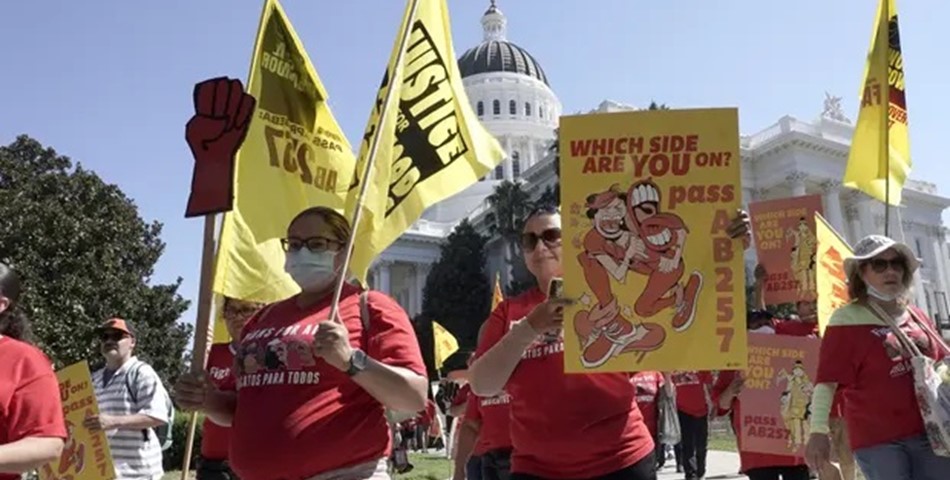The fast-food industry is seeking to overturn one of the most significant labor wins in recent American history by trying to scrap a new law in California that will establish an industry council for the sector on wage standards and other regulations, including safety.
The Fast Food Accountability and Standards Recovery Act, AB 257, was signed into law by the California governor, Gavin Newsom, on 5 September in what is seen as a huge fillip to a US labor movement seeking to capitalize on a wave of unionization drives.
McDonald's workers and labor activists protested to demands the company pay at least $15 an hour.
‘How are we supposed to live?’: fast-food workers squeezed by inflation
The law paves the way for a statewide fast-food sector council that includes workers, state regulators, franchises and their parent companies to establish wage standards and other regulations for the industry in the state.
There are about 500,000 workers in the fast-food industry in California who will be represented under the law. It also provides a pathway for local municipalities to create their own similar councils overseeing the industry and to report to the statewide council. The law only applies to fast-food corporations with at least 100 retail locations nationwide under a common brand.
The law is the first of its kind in the US, with workers in other states pushing to pass similar legislation, such as nail salon workers in New York.
Fast-food workers have long reported widespread issues of violence on the job, sexual harassment, discrimination, retaliation for reporting abuses or for organizing, wage theft and poverty wages. The new law has been touted as a means to start addressing these issues that run rampant through the industry. Fast-food workers around California held over 300 strikes in the past year to rally support in favor of the legislation.
As workers are now organizing to collect signatures to create the councils, the fast-food industry is mobilizing to try to overturn the law, claiming it will harm businesses and lead to a 20% increase in menu prices due to possible wage increases to up to $22 an hour in 2023. The industry also claims the law will not bolster worker protections.
Opponents have also claimed the law could lead to restaurant closures and dissuade franchise owners from opening new locations in California.
The National Restaurant Association and International Franchise Association has created a coalition of industry groups to back a statewide voter referendum initiative to overturn the law, and has warned that other states could follow suit in passing similar laws. Major fast-food corporations spent at least $1m lobbying against the bill between June 2021 and June 2022.
The law is set to come into effect on 1 January 2023, but could be delayed if a referendum vote is allowed to move forward. If the referendum request is accepted by California’s attorney general, the groups backing the referendum would have until 1 April 2023 to collect roughly 623,000 valid voter signatures to qualify for the 2024 state ballot.
During a press call, workers and labor leaders criticized the referendum proposal as a means to silence workers and an attempt by fast-food corporations to utilize their wealth to subvert democracy.












